|
|
|
Sort Order |
|
|
|
Items / Page
|
|
|
|
|
|
|
| Srl | Item |
| 1 |
ID:
171053
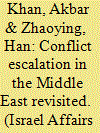

|
|
|
|
|
| Summary/Abstract |
This article argues that state sponsorship of terrorism is a by-product of conflicting relations between states that are generally hostile towards each other. States harbour and drive non-state actors, aiming to create security concerns to the target states, which provoke the target states to take retaliatory actions against the host and/or the terrorist group in a bid to avoid destabilization, uncertainty, and a possible shift in the balance of power between the sponsoring and target state. At this juncture, state sponsorship of terrorism contributes to escalating the conflict. Hence, this type of terrorism should not be treated as a distinct form of violence but as a corollary of interstate rivalries. Iran’s sponsorship of Hezbollah and the Houthis against the backdrop of its rivalry with Israel and Saudi Arabia offers a vivid demonstration of this escalatory dynamic.
|
|
|
|
|
|
|
|
|
|
|
|
|
|
|
|
| 2 |
ID:
171051
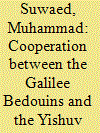

|
|
|
|
|
| Summary/Abstract |
During Israel’s War for Independence, the Bedouin tribes did not have a united attitude: Some tribes, who built good relations with the Jewish population, supported the Jewish side and fought with them, whereas other Bedouins tribes considered themselves part of the Palestinian population and fought with them. There were also tribes that supported no side and kept neutral.This article focuses on the Galilee Bedouin tribes, who chose to cooperate with the Jewish Yishuv and fought on their side. The article explains the background on which the relations between the Bedouins and the Jews in Galilee were built at the end of the Ottoman era and during the British mandate. It also examines the mutual trust and friendship that had developed between the Jewish population and their neighbor Bedouin tribes, leading them to cooperate with the Jewish side and support their cause. It analyzes causal factors and historical events that led certain Bedouin tribes to fight against the Jews and support the Palestinian side, and the reasons tribes kept neutral in this conflict.
|
|
|
|
|
|
|
|
|
|
|
|
|
|
|
|
| 3 |
ID:
171048
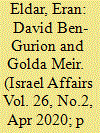

|
|
|
|
|
| Summary/Abstract |
Relations between David Ben-Gurion and Golda Meir were complex and saw many ups and downs over the years. Having enjoyed fruitful collaboration prior to and after Israel’s establishment, with Meir even appointed foreign minister at the height of her career, they were never close friends. The relationship took a steep downhill course in the early 1960s, culminating in Ben-Gurion’s secession from the ruling Mapai party and the establishment of his own rival Rafi party. This article describes and analyzes the complex relationship and the rift between these two central leaders of Mapai and its impact on the party and on the political map.
|
|
|
|
|
|
|
|
|
|
|
|
|
|
|
|
| 4 |
ID:
171047
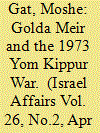

|
|
|
|
|
| Summary/Abstract |
Most historians blame Israeli Prime Minister Golda Meir for the outbreak of the 1973 Yom Kippur War, having allegedly rejected all peace proposals made by Egyptian President Anwar Sadat. In fact, Sadat was adamantly opposed to Meir’s demand for direct negotiations, envisaging political settlement as an American dictate on Israel. The Yom Kippur War shook both sides of their intransigence and brought them closer to each other’s position.
|
|
|
|
|
|
|
|
|
|
|
|
|
|
|
|
| 5 |
ID:
171052
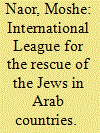

|
|
|
|
|
| Summary/Abstract |
This article discusses the campaign by the International League for the Rescue of the Jews in the Arab Countries (1948- 1950), formed by organisations representing Sephardi and Mizrahi Jews in Israel and the Herut party and aimed at preventing damage to the status of the Jews in the Arab states and promoting their emigration to Israel. The article will review the characteristics of the campaign, focusing on the public discourse it sparked in Israel around the idea of a population exchange between the Jews of the Arab states and the Palestinian refugees. This campaign, in which the memory of the Holocaust and the UN Convention on the Prevention and Punishment of the Crime of Genocide were employed, created a linkage between these two populations and expressed the political and social changes of this transitional period.
|
|
|
|
|
|
|
|
|
|
|
|
|
|
|
|
| 6 |
ID:
171055
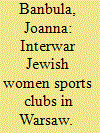

|
|
|
|
|
| Summary/Abstract |
This article discusses the role and significance of Jewish women sports activities in interwar Warsaw (1918–39). During this period, many independent women clubs and female sections in Jewish sports clubs operated in Poland, influenced by the Zionist idea of ‘Muscular Judaism.’ The Jewish sport heroines of this period were pioneers of physical culture, recording significant successes at national and international level.
|
|
|
|
|
|
|
|
|
|
|
|
|
|
|
|
| 7 |
ID:
171054
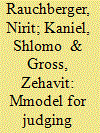

|
|
|
|
|
| Summary/Abstract |
This article presents a multi–variable model for the judgement of complex events in an intercultural situation. The participants in the study were 244 female students, who expressed negative emotions towards the events. Results of comparative analysis of the three events showed that the difference was not significant, χ2(34) = 36.47, p > 0.05, the events were similar with respect to the patterns of the structures of the connections between the variables, as predicted by the theoretical model. Forming judgements according to the model’s criteria will lead to greater moderation and mutual tolerance and to advancing and developing intercultural competence.
|
|
|
|
|
|
|
|
|
|
|
|
|
|
|
|
| 8 |
ID:
171050
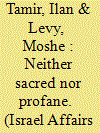

|
|
|
|
|
| Summary/Abstract |
The significant changes undergone by Israeli society notwithstanding, the Holocaust remains one of the foremost components of the collective memory, increasingly evoked in the public space including the media, popular music, and sports. Focusing on the infiltration of Holocaust discourse into the sphere of sports, as reflected in media coverage of sporting events, this article reveals a wide spectrum of Holocaust uses ranging from the derogatory to the laudatory – as means to inspire performance and extol achievements and unique sports moments.
|
|
|
|
|
|
|
|
|
|
|
|
|
|
|
|
| 9 |
ID:
171049
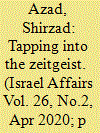

|
|
|
|
|
| Summary/Abstract |
Its close alliance with the West over the course of seven decades notwithstanding, Israel has embarked on an East-looking orientation during the past several years. Aiming to cultivate multifaceted connections to various Asian countries, the new Israeli approach has striven to enhance the Jewish state’s relationship with the East in the political, military, economic, financial, technological, and cultural spheres. For their part, many Asian states have displayed a keen desire to expand their growing interactions with Israel, smoothing the way for the success of Israel’s East-looking drive.
|
|
|
|
|
|
|
|
|
|
|
|
|
|
|
|
|
|
|
|
|